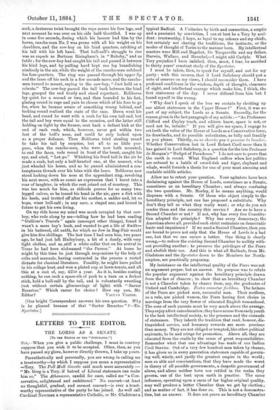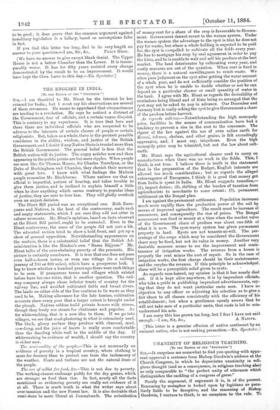LETTERS TO THE EDITOR.
THE LORDS AS A SENATE. [To THE EDITOR OF THE "Sriforsroa."] 'SIR,—When you give a public challenge, I must in courtesy suppose that you wish it to be accepted. Often, then, as you have passed my glove, however directly thrown, I take up yours.
Parenthetically and personally, you are wrong in calling me a trustworthy—by which I suppose you mean a representative —Tory. The Pall Mall Gazette said much more accurately :— 4' Mr. Greg is a Tory, if hatred of Liberal statesmen can make him so." The Athenceurn, candid for once, called me "a Con- servative, enlightened and embittered." No convert—at least no thoughtful, gradual, and earnest convert—is ever a trust- worthy representative of the party he has joined. As well call Cardinal Newman a representative Catholic, or Mr. Gladstone a
typical Radical. A Unitarian by birth and connection, a sceptic and a pessimist by conviction, I can at best be a Tory by acci- dent: trustworthy, I hope, as loyal to my colours and my chiefs, but certainly not sharing the traditions, the instincts, or the modes of thought of Tories to the manner born. My intellectual masters were Mill and Bagehot, De Tocqueville and my father, Darwin, Wallace, and Herschel,—I might add Carlyle. What Tory prejudice I have imbibed, then, must, I fear, be ascribed to thirty years' constant study of the Spectator.
I must be taken, then, to speak for myself, and not for my party ; with this reserve, that if Lord Salisbury should put a note of censure on my views, I should reconsider them. I have profound confidence in the wisdom, depth of thought, clearness of sight, and intellectual courage which make him, I think, the first statesman of the day. I never differed from him but I found myself in the wrong.
"Why don't I speak of the loss we sustain by shutting up our ablest statesmen in the Upper House P" First, it was no part of my subject, the Lords as a Senate. Secondly, for the reason given in the last paragraph of my article : —"As Professors Clifford and Cayley teach, and editors know, space is not, or need not be, infinite." If you will give me space, I engage to set forth the value of the House of Lords as a Conservative force, its drawbacks, and its possible substitutes, as fully and frankly as you please. Thirdly, on as cherche pas a prouver la lumiere. Whether Conservatism lost in Lord Robert Cecil more than it has gained in Lord Salisbury, is a question for the late Professor de Morgan's "Budget of Paradoxes." I do not care to prove that the earth is round. What England suffers when her politics are reduced to a battle of sword-fish and tiger, elephant and whale, would furnish a thesis for one of your most amusing and readable middle articles.
Allow me to retort your question. Your agitators have been declaiming against the House of Lords, sometimes as a Senate, sometimes as an hereditary Chamber ; and always confusing the two questions. Mr. Morley, if he means anything, would dispense with a Senate. Of those who object simply to the hereditary principle, not one has proposed a substitute. Why don't they tell us what they really want ; or why do you not render them and the country this service ? Are we to have a Second Chamber or not ? If not, why has every free Constitu- tion adopted the principle ? Why has every democracy, the American above all, provided such strict restraints on democratic haste and impatience P If we need a Second Chamber, then you are bound to prove not only that the House of Lords is a bad one, but that we can secure a better. One thing is clearly wrong,—to reduce the existing Second Chamber to nullity with- out providing another ; to preserve the privileges of the Peers and abolish their use. And this is what all Radicals, from Mr. Gladstone and the Spectator down to the Members for North- ampton, are practically proposing.
My insistence on the intellectual quality of the Peers was not an argument proper, but an answer. Its purpose was to refute the popular argument against the hereditary principle drawn from the law of chances ; to show that an hereditary Chamber is not a Chamber taken by chance from, say, the graduates of Oxford and Cambridge. Fortes creantur fortibus. The fathers of the Peers are picked men, successful men. Their mothers, as a rule, are picked women, the Peers having first choice in marriage from the very flower of educated English womanhood. The sons of such parents must be very much above the average. They enjoy a first-rate education ; they have access from early youth to the best intellectual society, to the presence and the counsels of statesmen. They inherit the tradition that rank, honour, dis- tinguished service, and honorary rewards are more precious than money. They are not obliged or tempted, like other political aspirants, to lie and cringe for promotion. Above all, they are educated from the cradle by the sense of great responsibilities. Remember what that one advantage has made of our Indian Civil Service. Out of a very few hundred men taken by chance, it has given us in every generation statesmen capable of govern- ing well, wisely, and justly the greatest empire in the world ; men so able and conscientious, that they have made the worst in theory of all possible governments, a despotic government of aliens, and aliens neither born nor settled in the realm they govern, one of the best upon earth in practice. The same influence, operating upon a caste of far higher original quality, may well produce a better Chamber than we get by election ; and as matter of fact, it has done so. This is not a demonstra- tion, but an answer. It does not prove an hereditary Chamber to be good ; it does prove that the common argument against hereditary legislation is a fallacy, based on assumptions false in fact.
If you find this letter too long, find in its very length an
answer to your question.—I am, Sir, &c., PERCY GREG.
[We have no answer to give except blank denial. The Upper House is not a better Chamber than the Lower. It is incom- parably worse. It has for fifty years resisted every change demonstrated by the result to be an improvement. It would have kept the Corn Laws to this day.—En. Spectator.]



































 Previous page
Previous page